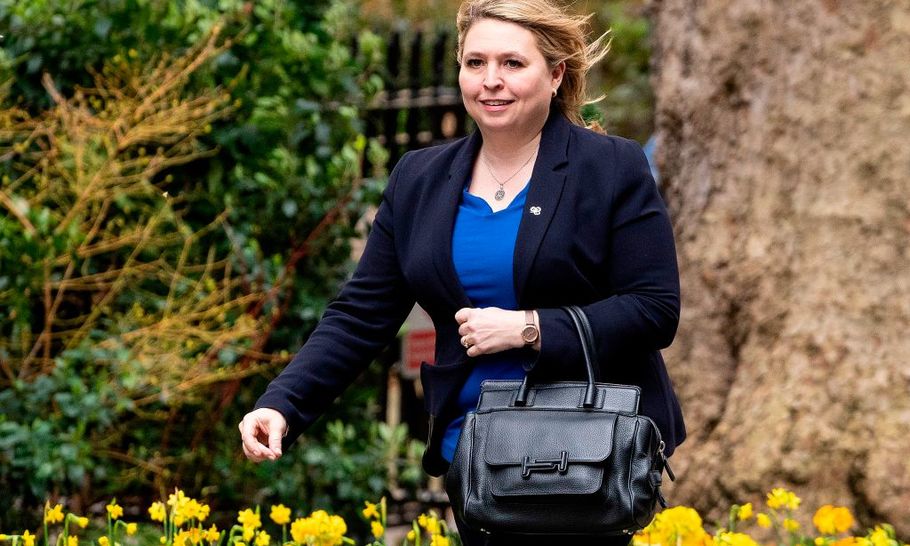It's time for gaffe prone Karen Bradley to go

NIKLAS HALLE’N/AFP/Getty Images
As Theresa May tries to persuade the DUP to finally accept the border backstop, the party’s Westminster leader has accused one of the prime minister’s staunchest cabinet allies of “glaring failures” in Northern Ireland. Nigel Dodds told The House magazine that the province’s secretary of state, Karen Bradley, presides over a dysfunctional department and called for “a change of leadership”.
This is just the latest suggestion that the minister should resign. Two weeks ago, the secretary of state angered victims’ groups when she made a crass remark in the House of Commons, implying that none of the deaths caused by the security forces during the Troubles amounted to murder.
This intervention came at a sensitive time, as families of people who died on Bloody Sunday waited to find out whether soldiers would be prosecuted for their involvement in the killings. In response to a question from DUP MP, Emma Little-Pengelly, Mrs Bradley claimed that deaths caused by the army and police in Northern Ireland, “were not crimes; they were people acting under orders and under instruction and fulfilling their duties in a dignified and appropriate way.”
This was a sweeping statement, that was hurtful and almost certainly inaccurate, and it confirmed the secretary of state’s reputation for gaffes. Yet, the thrust of her comments was not as outrageous as it has been portrayed. Bradley noted that terrorists were responsible for 90 per cent of Troubles related killings in Northern Ireland. All of these incidents were crimes, whereas the 10 per cent of deaths caused by the security forces were, for the most part, lawful and justifiable.
Currently, the past is being dealt with through a series of inquests and investigations that are focused disproportionately on killings carried out by the state. One of the soldiers implicated in the Bloody Sunday shootings now faces prosecution. This imbalance is likely to be worsened by ‘legacy structures’ proposed by the government and based on an agreement reached by the DUP and Sinn Fein. Currently, the Northern Ireland Office is sifting through 17,000 consultation responses to its controversial plans.
Mrs Bradley’s comments were particularly regrettable because they took the spotlight off a more important debate over the legacy of the past. They allowed Sinn Fein, whose movement was by far the biggest killer during the Troubles, to fume self-righteously about the iniquities of the police and army.
The secretary of state needed only to specify that the ‘overwhelming majority’ of deaths caused by the security forces were not crimes. Though, having ‘misspoken’, she should have issued her apology and retraction immediately. Instead, she ‘clarified’ her comments later that day and issued an apology the next, by which time the storm of outrage was well underway.
In normal circumstances, Mrs Bradley might have expected unionists to defend her remarks, even as nationalists called for her resignation and the Republic’s deputy prime minister advised her to “read a book on the history of Ireland”. She was trying to defend the security forces, who served with bravery during the Troubles and prevented Northern Ireland from descending into outright civil war.
Unfortunately for the secretary of state, she now struggles to find any supporters in the province. In charge of the Northern Ireland Office, she is responsible for the plans for legacy that threaten to put soldiers and policemen in the dock while terrorist godfathers and their apologists pontificate about truth and justice.
The day before her notorious statement, Bradley brought budgetary legislation to the Commons empowering civil servants at Stormont to spend money without scrutiny that would otherwise be the responsibility of devolved ministers. “We have to be very careful about the civil service’s separation and independence from scrutiny by political masters,” she told MPs, “it is the political decisions that need scrutiny, not the decisions of civil servants.”
In the absence of devolved institutions, the government has refused to implement direct rule in Northern Ireland, with the result that officials and politicians make important decisions, that are certainly political, with minimal oversight. The NI (Regional Rates and Energy) Bill was rushed through in a few hours, despite involving billions of pounds of public money, and the question of accountability was swept aside breezily by Mrs Bradley.
She justifies this democratic vacuum by claiming that she can get power-sharing up and running again. This analysis stretches credulity and the DUP’s East Belfast MP, Gavin Robinson, recently asked her “when in the past two months was there any genuine prospect of the Assembly being restored?”
The secretary of state has also decided to keep paying wages and expenses to Northern Ireland’s idle MLAs, well over two years after they last sat in a devolved Assembly. This policy is deeply unpopular with the Ulster public, members of which express frequent disapproval of politicians getting paid for ‘doing nothing’.
Karen Bradley would have hoped that the latest furore over her bungling in Northern Ireland would die down, as the focus switched again to Brexit and Bloody Sunday. She is a close friend of the prime minister and can count on her personal loyalty, but Dodds’ remarks will be another blow at a time when the DUP’s views are of intense interest to Theresa May.
The Secretary of State offended the Bloody Sunday families, among others, with an imprecise, badly chosen statement. Far more importantly, she is responsible for a process for dealing with Ulster’s past that is grossly unbalanced and she has knowingly consigned Northern Ireland to an extraordinary version of political limbo.





